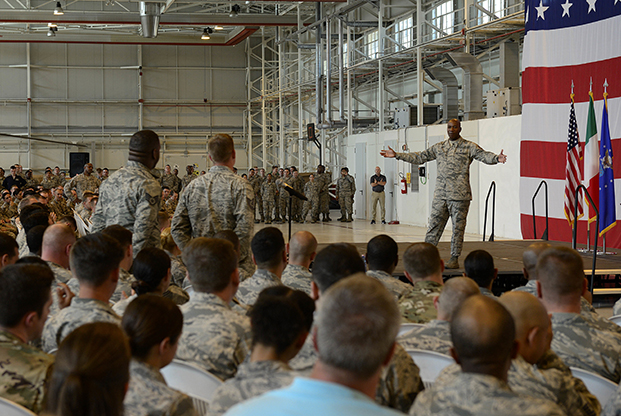
CMSAF Kaleth Wright answers a question at a July 30, 2018, all call at Aviano AB, Italy. Wright provided information about upcoming changes to the service and what enlisted airmen could expect. Air Force photo by Sgt. Cary Smith.
The Air Force is reforming how it evaluates enlisted airmen.
The policy changes come “in response to feedback from the field,” and are meant to give commanders more flexibility and to empower “performance within the enlisted corps,” according to a Jan. 23 release. The changes, which are slated to affect nearly all Active Duty, Guard, and Reserve enlisted airmen, “will appear in upcoming revisions of Air Force Instructions 36-2606, Officer and Enlisted Evaluation Systems and 36-2502, Enlisted Airman Promotion/Demotion Programs,” according to the release.
PERFORMANCE EVALUATION CHANGES
USAF’s reforms to enlisted performance evaluations include:
- Letting senior noncommissioned officers who earn an Associate’s Degree or higher “from a nationally or regionally accredited academic institution” be considered “for promotion and senior rater stratification or endorsement.” Previously, the release notes, airmen could only qualify for senior rater stratification and endorsement if their degrees came from the Community College of the Air Force.
- Taking ineligible airmen out of the senior rater stratification pool.
- Making performance evaluations optional for individuals reaching high year of tenure.
- Making the senior enlisted leader “a voting member of the Enlisted Forced Distribution Panel” versus a mere advisor.
- Giving large units the all-clear to utilize the Enlisted Force Distribution Panel process. “If a designated large unit chooses not to do so, the unit commander must publish and disseminate alternate procedures no later than the accounting date for each evaluation cycle to ensure transparency,” the release says.
- Letting commanders designate as many non-rated days as they deem necessary in cases in which they decide airmen have gone through “personal hardships during the reporting period.” That way, commanders can acknowledge the presence of “extenuating circumstances” on an airman’s annual evaluation without dinging them for it.
REFERRAL EVALUATION CHANGES
In response to recommendations from senior service leaders, the referral evaluation that is automatically triggered when a rater selects “‘met some, but not all expectations’” on AF Forms 910 and 911 will become a non-mandatory “referral enlistment report” as of Jan. 31, the release said. That gives raters a chance to pinpoint and record places where airmen can potentially improve.
In the release, CMSAF Kaleth Wright said this specific change will let raters simultaneously give airmen “more honest, realistic” performance feedback as well as “room to improve.”
Under the previous policy, if we set 100 expectations for an airman and they met or exceeded 99 of them but fell short on one, in essence we were saying they should be removed from promotion consideration,” Wright explained in the release. “That doesn’t align with our vision of talent management. We want supervisors and command teams to have the option to make decisions that make sense for our airmen, tailored to each individual situation.”
Wright added that giving commanders “this decision space” lines up with the service’s push “to revitalize squadrons and empower leaders,” which is one of Chief of Staff Gen. David Goldfein’s top focus areas, according to the release.